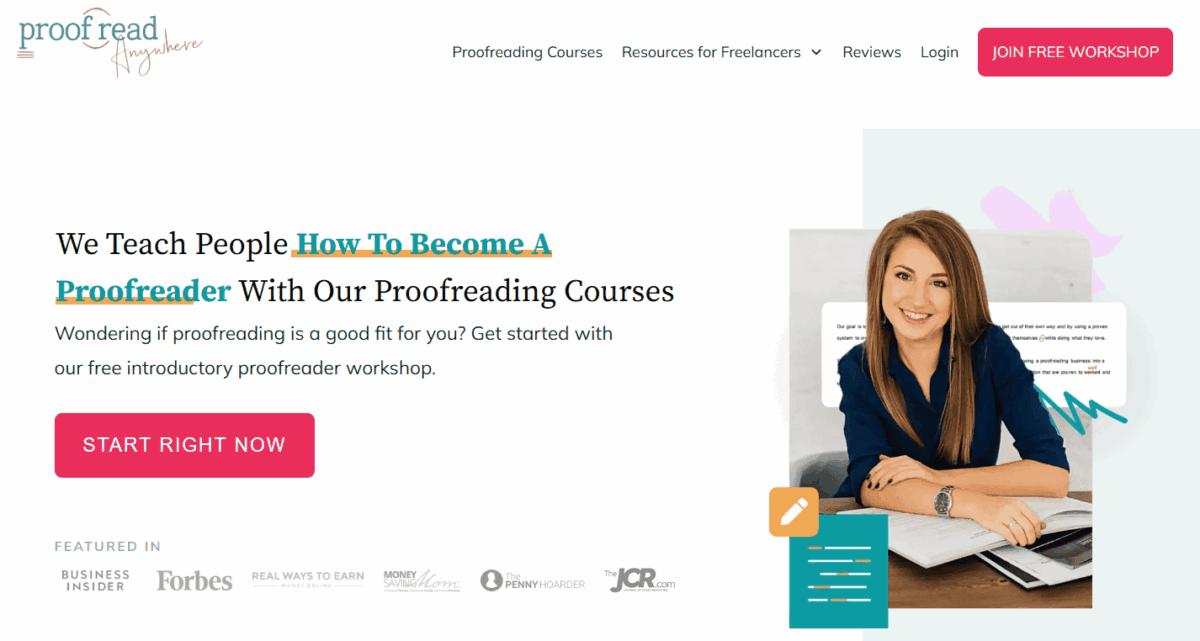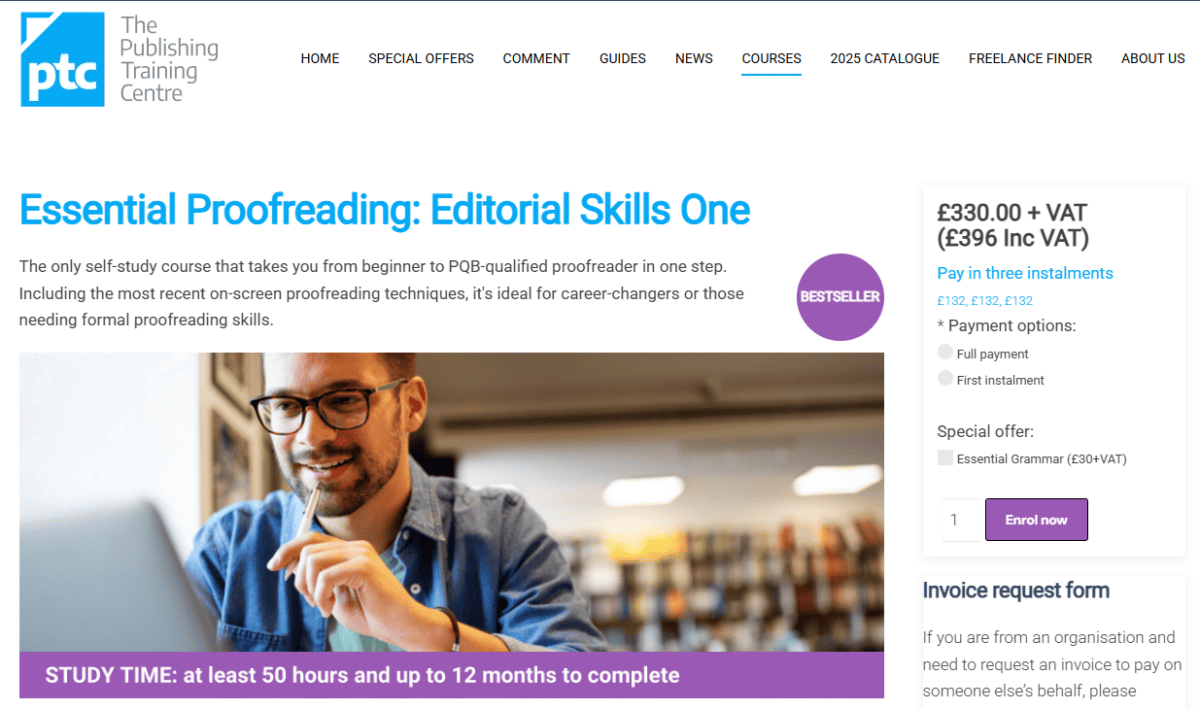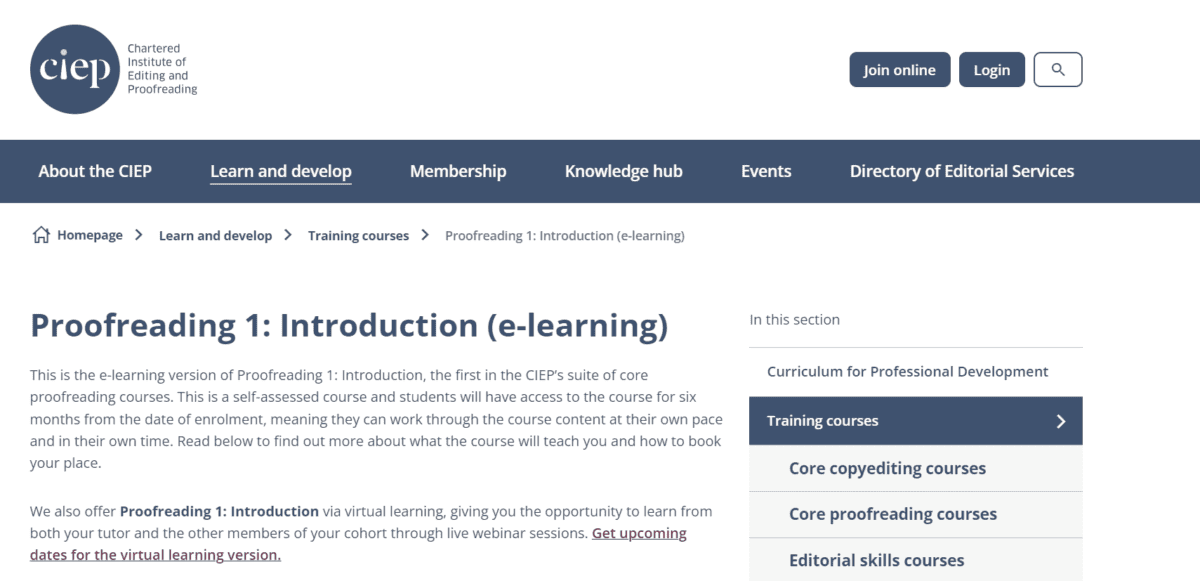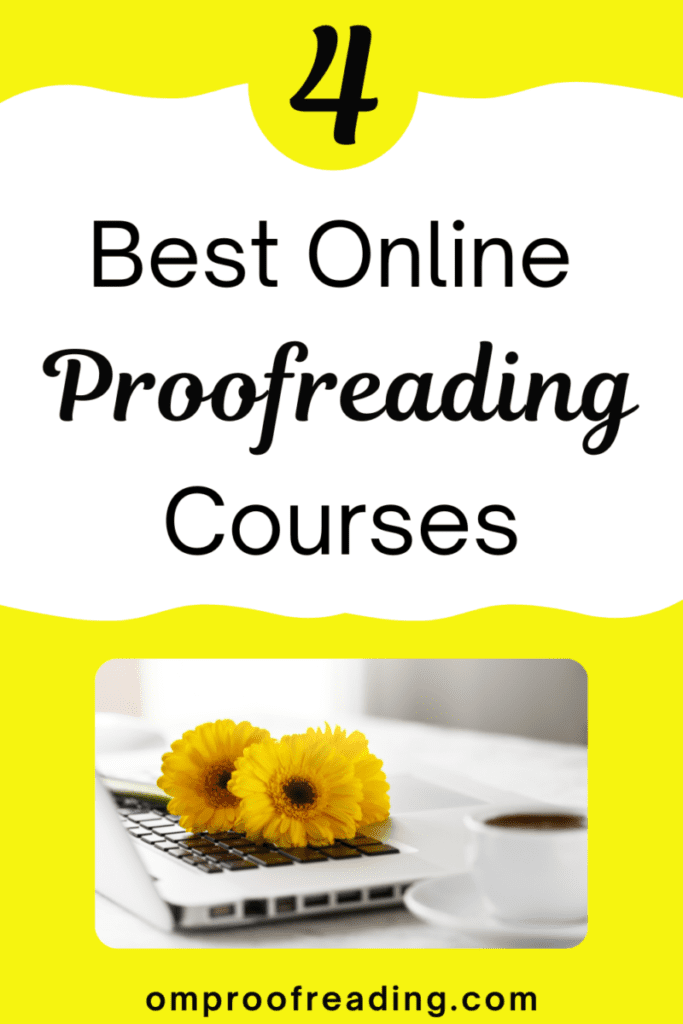This article may contain affiliate links. Please see our affiliate disclaimer in the footer menu for more information. Thank you for your support!

If you’re looking for the best online proofreading courses, I can help you. As a trained proofreader, I conducted comprehensive research before deciding which class to take. I chose the Proofread Anywhere course, but all the classes in this article will adequately prepare you to become a proofreader.
The best proofreading courses are General Proofreading: Theory and Practice™ by Proofread Anywhere, Becoming a Proofreader by Knowadays, Essential Proofreading: Editorial Skills One by The Publishing Training Centre (PTC), and a series of classes by the Chartered Institute of Editing and Proofreading (CIEP).
Let’s see what each of these classes offers so you can decide if one of them is right for you.
A Brief Look at Which Class Makes the Most Sense for You
| Company Offering Course | Best Bet if You Want . . . |
| Proofread Anywhere | training for building a business and marketing your services, and lifetime access to a peer support group |
| Knowadays | a chance to land guaranteed work (must also take Knowadays editing course) and access to tutors while training |
| PTC | to work at a publishing company and have one-on-one tutor support while training |
| CIEP | to work at a publishing company and can afford training from a prestigious organization |
A Quick Comparison of the Classes
Let’s get an overview of the primary differences between these courses.
Summary of the Main Differences
| Course | Certificate Given |
Special Course Feature |
|---|---|---|
| General Proofreading: Theory and Practice™ (Proofread Anywhere) |
see * | training to build a business and market your services |
| Becoming a Proofreader (Knowadays) |
yes | work guarantee possibility in conjunction with Knowadays’ editing course |
| Essential Proofreading: Editorial Skills One (PTC) |
yes | personally assigned tutor to guide you |
| It’s a series of three classes: Proofreading 1: Introduction Proofreading 2: Headway Proofreading 3: Progress (CIEP) |
yes | most prestigious training program |
*You earn a certificate from Proofread Anywhere if you purchase the Ignite Plus version of the course and score 90% or above on the final exam.
A Cost Comparison
| Course | Cost | Exact Price |
|---|---|---|
| General Proofreading: Theory and Practice™ (Proofread Anywhere) |
$$ | $697 for Ignite version, $797 for Ignite Plus version* |
| Becoming a Proofreader (Knowadays) |
$ | $499 |
| Essential Proofreading: Editorial Skills One (PTC) |
$ | £330 (roughly $410) + VAT |
| It’s a series of three classes: Proofreading 1: Introduction Proofreading 2: Headway Proofreading 3: Progress (CIEP) |
$$$$ | £870 for nonmembers (roughly $1,085) + VAT; discounts available for CIEP members |
*You’ll get a $100 scholarship to apply to either version of the course if you watch Proofread Anywhere’s free workshop.
Now that we’ve gotten an overview, let’s dive into the details.
The courses are taught in either US or UK English. These dialects have differences in grammar, punctuation, spelling, and vocabulary.
The variations aren’t too difficult to learn, but realize you’ll need to do some self-study to master them.
The Proofread Anywhere and Knowadays programs provide some content to help you learn how these dialects vary, but they don’t cover all the details.
All the courses below are suitable for beginners except the second and third classes in the CIEP series.
Note: I published a piece about what to look for in an online class if you need guidance.
The Four Best Online Proofreading Courses
1) General Proofreading: Theory and Practice™ by Proofread Anywhere

Proofread Anywhere is a business that offers online training for proofreaders.
I chose this company for my training and would choose it again. I believe it offers the best value for the money.
From June 12th–16th, Proofread Anywhere is offering 70% off either version of the General Proofreading: Theory & Practice™ course.
Proofread Anywhere Course: Pros, Cons, and Key Takeaways
Pros
- only class that provides in-depth training for building a business and marketing yourself
- teaches you how to navigate one of the most commonly used style guides (CMOS)
- training in grammar, punctuation, spelling, etc., and guidance for integrating AI into your proofreading work
- lifetime access to course materials and a supportive Facebook group
Cons
- company not as well-established in the publishing industry (compared to the CIEP & PTC)
- limited access to support from staff (must pay extra for tutoring)
- doesn’t teach you how to proofread typeset documents
Key Takeaways for “The Most Well-Rounded Program”
Take this class if you want to learn how to build an online business and market yourself, want lifetime access to a peer support group, and would like to learn how to proofread using a specific style guide.
Note: This is the only course of the four that doesn’t teach you how to proofread typeset documents. However, you’ll probably only need this knowledge if you work for a publishing company.
Details of General Proofreading: Theory and Practice™
Who It’s For: This class is especially well-suited to people who want to learn how to proofread books (nonfiction and fiction) since it teaches you how to use The Chicago Manual of Style (CMOS), the go-to guide for the book publishing industry in the United States.
Cost: General Proofreading: Theory and Practice™ (Ignite): $697 OR General Proofreading: Theory and Practice™ (Ignite Plus): $797
The Ignite Plus course includes everything in the Ignite course, including a final exam (graded by hand). If you pass the exam with a score of 90% or higher, you will receive the following:
- a certificate of completion
- one year of free access to the new Hire a Proofreader Directory, where you can add your profile and look for work on the job dashboard
- membership in a Facebook marketing mastermind group designed for general proofreading students with verified skills
Trustpilot Rating: 4.5/5.0 (excellent) from over 300 reviews
Prerequisites: None. However, they recommend that you have a good eye for detail.
Required Texts: The recommended texts are the The Chicago Manual of Style (CMOS) and Merriam-Webster’s Collegiate Dictionary (11th Edition).
Note: The most current version of The Chicago Manual of Style is the 18th edition. However, the last time I checked, the course was still using the 17th edition to annotate the proofreading practice essays.
Duration: Self-paced (takes a minimum of one month to complete). They’ve added lots of new content, so it will likely take up to a few months to finish the class if you can’t spend substantial time studying each day.
Time to Access Course: Lifetime (includes any updates). You also have lifetime access to a Facebook support group.
Grade Given: Yes, if you purchase the Ignite Plus version of the course
Certificate of Completion: Yes, if you buy the Ignite Plus version of the program and pass the final exam with a score of 90% or higher.
The certificate acknowledges that you passed the final exam with a grade of 90% or above.
Here’s mine so you can see what it looks like:
Course Creator: Caitlin Pyle; she has extensive experience in general and transcript proofreading
Instructor Feedback: Yes. Currently, the program has a team member who is quite active in the private Facebook support group. You can also search the group discussions to find answers to almost any question you may have.
If you need more individualized attention, you can purchase tutoring sessions. They cost $50 per 30-minute session.
Course Taught in US or UK English: US English
Course Content: 14 modules; reading material, worksheets, quizzes, videos, and 40+ documents to proofread
Main Topics:
- Grammar, punctuation, spelling, and word use
- Proofreading methods (e.g., working in MS Word, Google Docs)
- Working with style guides
- Proofreading academic, creative, and business writing
- Building a business and finding clients
- Using AI tools to increase efficiency
Additional Notes: This class comes with the following resource guides:
- Look Better in Writing™ Handbook of Commonly Misused (and Abused!) Words
- The Ultimate Freelancer Tax Guide
- The Mindset Mastery Guide
- 5 Mindset Shifts for Goal-Crushing Confidence
A Money Mindset Transformation workshop (and workbook) is also included.
If you’d like more info about this course and creating a profitable freelance proofreading business, you can sign up for this free 76-minute workshop.
You’ll receive a $100 scholarship for either version of the course, but you have to use it within one hour of completing the workshop.
If you’d like to learn more, I wrote an in-depth article about why Proofread Anywhere is well worth the money.
2) Becoming a Proofreader by Knowadays

Knowadays (formerly Proofreading Academy) provides online classes for students who want to start a new side hustle or career.
I’ve completed part of their proofreading course and was quite impressed by it.
Knowadays Course: Pros, Cons, and Key Takeaways
Pros
- only program that offers guaranteed work (only in conjunction with their editing course) to those who qualify
- training in grammar, punctuation, spelling, etc.
- supportive tutors to answer course-related questions and lifetime access to class materials
- teaches you how to proofread typeset documents
Cons
- company not as well-established in the publishing industry (compared to the CIEP & PTC)
- minimal training on how to set up a business and market yourself
- competition for jobs at Proofed will eventually increase as more people qualify for the guaranteed work offer
Key Takeaways for “The Program with the Work Guarantee”
Take this class if you want to be eligible for a work guarantee (only in conjunction with Knowadays’ editing course), want one-on-one support from tutors, and would like to learn how to proofread typeset documents.
Details of Becoming a Proofreader
Who It’s For: This class is particularly well-suited to those who want to learn how to proofread academic texts since it teaches a variety of academic referencing styles, including Harvard, APA, MLA, Chicago, and Turabian.
Cost: $499
Trustpilot Rating: 4.8/5.0 (excellent) from over 500 reviews
Prerequisites: None
Required Texts: None listed. However, you need Microsoft Word (2016 or later) to work through the course.
Duration: Self-paced; takes roughly 20–40 hours to finish
Time to Access Course: Lifetime (includes any updates)
Grade Given: Yes, you’ll receive a grade for the final assignment.
Certificate of Completion: Yes, all students receive a CPD-accredited certificate at the end of the class. CPD stands for Continuing Professional Development.
Course Creators: A team of proofreading and editing experts from Proofed—a reputable online proofreading and editing company
Instructor Feedback: You can email tutors with questions throughout the class and schedule a tutor support call for free if something is still unclear. Tutors also provide comprehensive feedback on the final assignment.
Course Taught in US or UK English: US English (but a version in UK English is available upon request)
Course Content: 13 modules; reading material, quizzes, videos, and assignments (including real-life example jobs)
Main Topics:
- Grammar, punctuation, spelling, word use
- Proofreading methods (e.g., working in MS Word, Google Docs)
- Working with style guides
- Proofreading academic, creative, and business writing
- Academic referencing and citations
- Finding work
Additional Notes: They offer a work guarantee with their sister company, Proofed. To qualify for guaranteed work, you need to take the Becoming a Proofreader and Becoming an Editor course (bundle deal available for 15% off) and score 80% or higher on the final exam in each class. You begin work on a trial basis. If the trial goes well, you can take on longer and more complex documents.
If you’d like to go to the free trial for the Becoming a Proofreader class or the Proofreader and Editor Course Bundle, you can do so here. You’ll need to click the “Learn More” button to get to the free trials.
You can use the code OMPROOF10 for a 10% discount on the Becoming a Proofreader course.
I wrote a comprehensive post about Knowadays if you’d like more information.
3) Essential Proofreading: Editorial Skills One by The Publishing Training Centre

The Publishing Training Centre (PTC) is a network of professionals who provide courses for the publishing industry and the broader business world.
The PTC Course: Pros, Cons, and Key Takeaways
Pros
- training from a very well-established and reputable company
- both course creators have worked in the industry for 35+ years
- a personal tutor to support you throughout the program
- free training manual to help you start a successful career
Cons
- no training in grammar, punctuation, spelling, etc.
- course teaches how to mark up on paper with British Standards Institution symbols (a skill you may never use)
- basic user interface
Key Takeaways for “The Program with a Personal Tutor”
Take this class if you aspire to work at a publishing company, want the guidance of a personal tutor throughout the course, and want training from a well-known name in the publishing industry.
Details of Essential Proofreading: Editorial Skills One
Who It’s For: This course is ideal for people wanting to work for a publisher.
Cost: £330 + VAT
Trustpilot Rating: N/A
Prerequisites: None. However, they strongly recommend taking their Essential Grammar class (available for £35 with your purchase of the Essential Proofreading course). They also recommend that you are detail-oriented and can concentrate at length. You should have a firm grasp of conversational English and grammar, punctuation, and spelling. Finally, they suggest you have broad general knowledge and are eager to learn.
Required Texts: None listed. However, you need to have Microsoft Word (2010 or later) and Adobe Reader XI or DC (free version) to complete the training.
Duration: Self-paced; takes at least 50 hours to finish
Time to Access Course: 12 months; you can study for another 12 months if you pay a re-registration fee of £75
Grade Given: Yes, please see the next bullet point.
Certificate of Completion: Yes, you receive a certificate of completion from The Publications Qualification Board. The certificate indicates a grade of “pass,” “merit,” or “distinction.”
Course Creators: Gillian Clarke—a founder member and honorary member of the Society for Editors and Proofreaders (SfEP), now the Chartered Institute of Editing and Proofreading (CIEP); Margaret Aherne—a founder member of the SfEP
Instructor Feedback: Each student is assigned a tutor who offers support throughout the class and up to three months after completion. The tutor will grade and provide feedback on four assignments.
Course Taught in US or UK English: UK English
Course Content: 6 units; reading material, exercises, and assignments (including real-life example jobs)
Main Topics:
- Proofreading techniques
- Best practices and using good judgment
- Proofreading vs. proof-editing
- Working on PDFs
- Working for publishers
- The BSI symbols
Additional Notes: Upon enrollment in Essential Proofreading, you can take two of the following e-learning modules for free:
- Proofreading PDFs: A Complete Guide for Editors
- A Copy-Editor’s Guide to Working with Authors
- Introduction to Marketing
- Introduction to Publishing
After completing the Essential Proofreading course, they’ll send you a free training manual (Successful Editorial Freelancing) to help you plan and progress in your new career.
Finally, you’ll be listed in The Publishing Training Centre’s Freelance Finder, where publishers can find highly qualified proofreaders.
You can learn more about the PTC course here.
4) A Series of Courses by The Chartered Institute of Editing and Proofreading

The Chartered Institute of Editing and Proofreading (CIEP) is an organization that offers classes for the publishing industry.
They recommend a series of three classes:
1) Proofreading 1: Introduction (I’ll call it P1.)
This course is not enough training to start working as a proofreader.
2) Proofreading 2: Headway (I’ll call it P2.)
This class provides enough training to start working on short, uncomplicated documents.
3) Proofreading 3: Progress (I’ll call it P3.)
This course gives you the skills to work on a full range of documents.
The CIEP Series: Pros, Cons, and Key Takeaways
Pros
- training from a highly prestigious editorial organization
- program created by a long-standing authority in the publishing industry
- a very comprehensive training program (if you take all three classes in the series)
- P1 course can be taken alone to see if proofreading is a good fit for you; P2 and P3 classes are suitable for proofreaders who already have experience and meet the prerequisites
Cons
- quite expensive and no training in grammar, punctuation, spelling, etc.
- classes teach you how to mark up on paper with British Standards Institution symbols (a skill you may never use)
- no training on how to set up a business and market yourself
Key Takeaways for “The Most Prestigious Program”
Take these classes if you aspire to work at a publishing company, want training from a prestigious name in the publishing industry, and are willing to pay a high price.
Details of the CIEP Series
Who It’s For:
These classes are ideal for those wanting to work for a publisher.
Let’s see what proofreading level is needed for each course.
P1: Beginners who are thinking about becoming proofreaders
P2: Those with some proofreading knowledge and experience who want to know more (they strongly recommend taking P1 first)
P3: Those who have a solid foundation in proofreading and are ready to advance to the next level (they highly recommend taking P1 and P2 first); also for proofreaders coming back to the profession after a break
Cost:
P1: £190 + VAT / CIEP Members: £115 + VAT
The P1 class is now available in a virtual learning format. It consists of four live webinar sessions (one per week) that last 2.5 hours at most. Nonmembers pay £345 + VAT, and members pay £205 + VAT.
P2: £340 + VAT / CIEP Members: £235 + VAT
P3: £340 + VAT / CIEP Members: £235 + VAT
Taking all three classes costs £870 + VAT for nonmembers and £585 + VAT for members.
Trustpilot Rating: N/A
Prerequisites:
P1: Good grasp of English grammar, a wide range of general knowledge, familiarity with MS Word and Adobe Acrobat Reader DC
P2: Prerequisites for P1 and an understanding of proofreading basics as taught in P1
P3: Prerequisites for P1 and an understanding of proofreading basics as taught in P1 and P2
Required Texts: None listed
Duration: Self-paced; the three classes combined take at least 50 hours to complete
Time to Access Course: six months per course
Grade Given:
P1: No
P2: Yes, please see the next bullet point.
P3: Yes, please see the next bullet point.
Certificate of Completion:
P1: Yes
P2: Yes, you’ll receive a certificate of completion if you complete (but do not pass) the class. If you pass it, you’ll receive a certificate showing you have passed either with “merit” or “distinction.” Your performance on the final assignment determines the degree to which you pass.
P3: Yes, in the same manner as in the P2 course.
Course Creator: The CIEP
Instructor Feedback: A tutor is available for one hour of support per course. The tutor will answer questions you have throughout the training. You can purchase additional tutoring if needed.
P1: Tutor does not grade any of your work
P2: Tutor grades and provides feedback on three assignments (the third assignment is the final assignment)
P3: Tutor grades and offers input on three assignments as well as the final assignment
Course Taught in US or UK English: UK English
Course Content:
P1: 6 units; reading material, exercises, and assignments
P2: 6 units; reading material, exercises, and assignments (including real-life example jobs)
P3: 8 units; reading material, exercises, and assignments (including real-life example jobs)
Main Topics:
P1:
- Types of mistakes to correct
- Marking errors using BSI symbols, PDF markup tools, and Word’s Track Changes
- Applying some common editorial conventions in the UK
- Using good judgment with how much to change
- Proofreading vs. proof-editing
- Communicating clearly with clients about the scope of work
- Understanding where proofreading fits into the publishing process
P2:
- Common editorial conventions and house style
- Dealing with layout issues
- Handling illustrations, tables, notes, and references
- Proofreading a variety of documents
- Strategies for increasingly difficult texts
P3:
- Tackling more complex documents
- Using BSI symbols and PDF Comment tools
- Managing layout issues (including overmatter)
- Handling documents with illustrations, tables, notes, and references
- What to do when more than proofreading is needed
- Types of documents your skills are best suited to
Additional Notes: None
You can check out the CIEP class series here.
An Honorable Mention
The Editorial Freelancers Association (EFA) is a well-known organization in the United States that deserves mention.
The Editorial Freelancers Association

The EFA offers online proofreading courses throughout the year. Past proofreading programs they’ve provided include Proofreading: The Basics, Proofreading 101, and Proofreading 201.
These courses require advance registration and have limited space. Furthermore, they only offer specific classes at certain times during the year.
If you want comprehensive training, you’ll probably need to take more than one of these classes; however, getting them to line up with each other will likely be challenging.
You can visit the EFA website to see which courses they currently offer.
Students who take these courses do not receive a certificate. However, the EFA states that students can contact an individual instructor who can verify the student’s participation in a class by writing a letter.
Frequently Asked Questions
How do you become a certified proofreader?
Currently, the only option to get a professional certification in proofreading is to pass the proofreading exam offered by Editors Canada, an editorial association based in Toronto, Ontario. However, taking the exam costs $550 for nonmembers and $450 for members.
Furthermore, they recommend that people taking the exam have at least five years of full-time experience working as a proofreader since the exam tests for “excellence (rather than proficiency).”
Becoming a certified proofreader is not necessary to land proofreading jobs. However, if you’d like to know more about this topic, I penned a post about becoming a certified proofreader.
Are proofreading courses worth it?
A proofreading course is worth the investment in time and money if you want to become a professional proofreader. Lots of competition exists in the proofreading industry, so completing a program is one way to help you stand out.
A course will also give you confidence in your abilities and show potential clients you have the skills needed to do the job well. Earning clients’ trust can be more challenging if you don’t have experience, so a class can help boost your trustworthiness from the get-go.
How long does it take to complete a proofreading course?
Generally, it takes about 50 hours to complete a comprehensive proofreading course that will prepare you to be a proofreader. To finish a 50-hour class in one month, you’d need to study for about one hour and 45 minutes daily (including weekends).
Simple proofreading courses on Skillshare and Udemy typically take 2–4 hours to finish.
How much can a beginner proofreader make?
A beginner proofreader can make roughly $12–$18 per hour. But this depends on whether you work for yourself or someone else, the genre of the texts you take on, and how fast you can proofread.
For example, you’ll earn more proofreading theses you receive via your own clients than by tidying up simple newsletters from customers on Upwork.
As you get more experience and testimonials, you can charge more money. What does “more money” look like? Here are a couple of useful statistics:
- ZipRecruiter (February 2025) reports that the average yearly pay for a freelance proofreader in the US is $57,520, which is $28.00 per hour.
- According to the US Bureau of Labor Statistics (May 2023), proofreaders are paid an average of $51,100 annually, which translates to $24.57 per hour.
What qualifications do proofreaders need?
Generally, you don’t need qualifications (e.g., degree, certification) to be a proofreader. However, some jobs require experience, a degree, or both. What proofreaders do need is the skill set to do the job well.
You can learn these skills by taking a thorough proofreading class, like the ones mentioned in this article. I penned a post about proofreader qualifications if you’d like more info.
A Word of Caution about Low-Cost Proofreading Classes
As mentioned, I don’t recommend low-cost courses for aspiring proofreaders.
As someone who has completed the Proofread Anywhere program and works in the field, I don’t think a course costing around $100 could possibly provide you with enough training to compete with well-trained proofreaders.
I would encourage you to find successful proofreaders in the industry and ask them for their opinions! I think you’ll find that adequate training is necessary to succeed in this field.
I would only recommend low-cost (or free) proofreading classes (such as those found on platforms like Udemy and Skillshare) for those interested in exploring proofreading as a potential job, people wishing to learn the basics of proofreading, and experienced proofreaders wanting to brush up on their skills.
Considering how much proofreaders earn, it’s illogical to think you could make that kind of money after taking an inexpensive class that only takes a few hours to complete.
Also, having a strong command of the English language isn’t the only thing you need to become a successful proofreader. You need to know how to navigate at least one major style guide (e.g., The Chicago Manual of Style) and how to use software like MS Word and Google Docs to mark up your clients’ texts.
The most significant benefit you’ll receive from a proofreading program is the feedback after proofreading a wide array of real-life example documents.
Now, on to the research I did to write this article.
My Research Process to Find the Best Courses

To create this list, I looked into seventeen editorial organizations across four countries—the US, the UK, Canada, and Australia.
I also investigated several other companies that offer proofreading classes.
The businesses varied widely in reputation and the depth of training they provided.
All the organizations listed in this article are reputable names in the publishing industry.
Proofread Anywhere and Knowadays are much newer than the other two organizations, but they’ve seen impressive growth over the past several years.
Proofread Anywhere’s general proofreading class was launched in April 2017, and the Knowadays class debuted in August 2017.
I hope this article has helped you learn everything you wanted to know about the best proofreading courses.
I wish you good luck pursuing your goals, whatever those may be!
Best wishes to you!
“What you get by achieving your goals is not as important as what you become by achieving your goals.”
– Henry David Thoreau

Recent Posts
Punctuation is important because it enables us to communicate our message clearly and effectively. Without punctuation, we wouldn’t understand how units of a sentence relate to one another or how...
Although you're probably somewhat familiar with adverbs, you may be unaware of sentence adverbs. As a trained proofreader who has studied the parts of speech, I can help you understand this unique...
